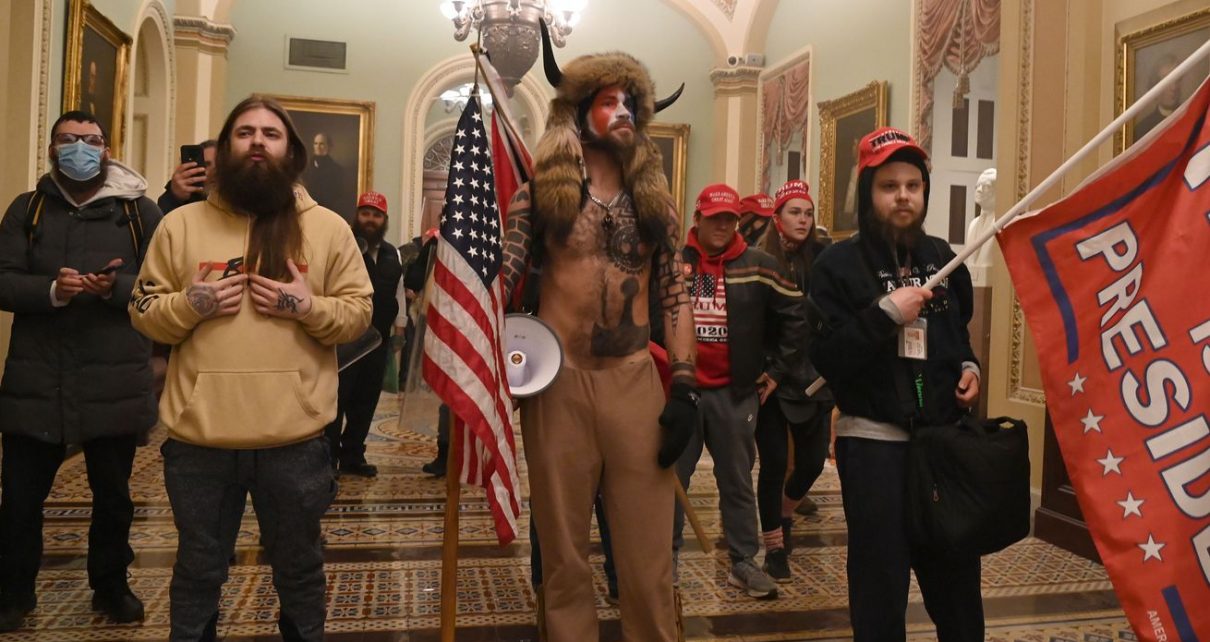
More sweeping domestic terrorism laws could be used against marginalized communities.
As lawmakers consider how to prevent future violence in the vein of January’s attack on the US Capitol, the debate has largely turned on one point: whether the US should create a new criminal law penalizing acts of domestic terrorism.
There are existing federal laws that criminalize domestic terrorism. The Patriot Act, which was enacted in the wake of 9/11, defined domestic terrorism as criminal acts that are “dangerous to human life” and are “intended to intimidate or coerce a civilian population or to influence the policy of a government by intimidation or coercion” or “to affect the conduct of a government by mass destruction, assassination or kidnapping.” Experts say that the storming of the Capitol fits that definition.
But no existing laws make domestic terrorism a “chargeable offense on its own” with attached criminal penalties, as the Congressional Research Service recently noted. It can, however, be an element of other federal crimes, such as assault and firearms offenses, and result in an enhanced sentence.
Some have argued that’s not enough to effectively prosecute domestic terrorism. Richard Zabel, a former deputy US attorney overseeing terrorism prosecutions in New York, wrote in the Washington Post that current law “limits our societal condemnation of the defendants and their dangerous ideologies.” The threat of domestic terrorism — which was not prioritized by former President Donald Trump, who repeatedly refused to denounce white nationalists and told those who stormed the Capitol, “We love you” — would be taken more seriously if it were easier for prosecutors to charge people as domestic terrorists, Zabel and others have argued.
But civil rights groups, including the Center for American Progress, a progressive think tank, are raising concerns that the harms of enacting those legal authorities outweigh the benefits: They argue it would enable law enforcement to target political dissidents, and those in marginalized communities who are frequently the victims of domestic terrorism, in violation of their constitutional rights.
“Such a law is not needed given the broad reach of existing criminal statutes,” Mara Rudman, executive vice president for policy at the Center for American Progress, said in a statement. “It will not solve the problem of domestic extremism and is likely to lead to unintended harms. … As lawmakers explore options for cracking down on these lawless and hateful acts, they should take care to ensure that the solutions do not create new risks for the communities they are trying to protect.”
At this point, the Domestic Terrorism Prevention Act — which passed the House with a bipartisan, two-thirds voice vote last September and was reintroduced this year — is the most viable proposal to improve the federal government’s response to domestic terrorism currently being considered in Congress. Rather than creating new legal authorities to prosecute domestic terrorism, it would instead aim to better employ existing tools, ensure that the issue is being prioritized at the agency level, and improve law enforcement accountability.
“The intent here is the prevention of terrorism, and the aspect of prosecution is left to current statutes,” Rep. Brad Schneider (D-IL), one of the co-sponsors of the legislation in the House, told Vox.
Law enforcement has a history of targeting marginalized communities
New legal authorities to prosecute domestic terrorism would endanger racial or ethnic minorities and the LGBTQ community, who have been disproportionately targeted by law enforcement and have also been most likely to be targeted in terrorist attacks because of their identity, according to data from the Center for Strategic and International Studies.
“History is replete with examples of such laws being weaponized and used against vulnerable citizens, especially Black Americans, and against individuals who criticize the government,” Rudman said.
That history goes back to at least the era of J. Edgar Hoover, who targeted “Black Moses” Marcus Garvey in 1919 because of his alleged association with “radical elements” that were “agitating the Negro movement.”
But even in recent history, the FBI’s counterterrorism division identified “black identity extremists” — a category that emerged in a leaked 2017 agency report and for which terrorism experts see no legitimate basis — as a growing threat. The report argued that opposition to racially-motivated police brutality and inequities in the criminal justice system could lead such a group of people to commit premeditated violence against law enforcement. It was dated just nine days before white supremacists held the “Unite the Right” rally in Charlottesville, North Carolina, where James Alex Fields Jr. drove his car into a crowd of counterprotesters, killing one and injuring another 19.
Despite the growing threat of white supremacist violence, the FBI prioritized investigations of “black identity extremists” under an intelligence collection operation it called “Iron Fist,” and used its most sophisticated surveillance aircraft to monitor Black Lives Matter protests in Baltimore in 2018 and again in Washington, DC, last June.
If the US were to enact a new criminal statute to prosecute domestic terrorism, there is a “tremendous amount of danger that you’re going to see people suddenly being charged with terrorism at the next Black Lives Matter protests,” Katrina Mulligan, the Center for American Progress’s acting vice president of national security and international policy, said.
Law enforcement agencies have also targeted faith communities in violation of their religious liberties. In 2006, for example, the FBI monitored and infiltrated a Muslim community in Orange County, California, with the aim of gathering information on hundreds of people, including names, telephone numbers, emails, political and religious views, and travel plans, focusing particularly on people who were devout. The agency never brought terrorism charges or obtained criminal convictions against community members and was accused of unlawfully targeting people based on their religious beliefs, breaching their First Amendment rights.
The federal government can combat domestic terrorism using existing legal authorities
Rather than creating a new criminal law for domestic terrorism, law enforcement could put more resources toward using existing legal authorities to prevent terrorist attacks and prosecute those responsible.
Law enforcement has been operating in a post-9/11 paradigm where “radical Islamic terrorism” was considered the biggest threat and demanded the most resources. After the 2017 rally in Charlottesville, Trump ignored his advisers’ pleas to reevaluate his administration’s response to the domestic terrorism — and was reluctant to even use the phrase “domestic terrorism” to describe the threats the US was facing. He later redirected resources away from combating domestic terrorism and toward addressing “radical Islamic terrorism” instead.
As a result, less than a quarter of the FBI’s counterterrorism field agents were investigating domestic plots in 2019. By October 2020, DHS had identified white supremacists as the deadliest terror threat facing the country.
With the Biden administration receptive to prioritizing the threat posed by right-wing extremists, law enforcement agencies are no longer fighting an uphill battle. They can fully implement existing criminal laws and financial tools to combat domestic terrorism, make prosecuting hate crimes a higher priority for law enforcement and national security officials, and improve research, data collection, and reporting.
The Domestic Terrorism Prevention Act, which has been introduced by Sen. Dick Durbin (D-IL) and endorsed by the NAACP and the Anti-Defamation League among other groups, would help advance those goals.
It would create new offices focused on domestic terrorism within the Department of Justice, the Department of Homeland Security, and the FBI — agencies where efforts to cooperate on prosecuting domestic terrorism have fallen short in the past. It would provide training and resources to state, local, and tribal law enforcement agencies to identify, prevent, and investigate acts of domestic terrorism and white supremacy, as well as establish an interagency task force to address white supremacist infiltration of the military and federal law enforcement.
The bill would also require law enforcement agencies to jointly report on the state of domestic terrorism threats twice a year to Congress, which will inform how they can focus their limited resources on the most pressing threats facing the US.
“I think the transparency should result in better outcomes,” Rep. Schneider said.




